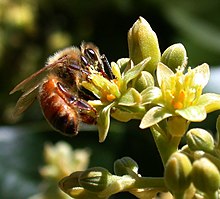Our website is made possible by displaying online advertisements to our visitors.
Please consider supporting us by disabling your ad blocker.
Ecosystem service

Ecosystem services are the various benefits that humans derive from healthy ecosystems. These ecosystems, when functioning well, offer such things as provision of food, natural pollination of crops, clean air and water, decomposition of wastes, or flood control. Ecosystem services are grouped into four broad categories of services. There are provisioning services, such as the production of food and water. Regulating services, such as the control of climate and disease. Supporting services, such as nutrient cycles and oxygen production. And finally there are cultural services, such as spiritual and recreational benefits.[1] Evaluations of ecosystem services may include assigning an economic value to them.
For example, estuarine and coastal ecosystems are marine ecosystems that perform the four categories of ecosystem services in several ways. Firstly, their provisioning services include marine resources and genetic resources. Secondly, their supporting services include nutrient cycling and primary production. Thirdly, their regulating services include carbon sequestration (which helps with climate change mitigation) and flood control. Lastly, their cultural services include recreation and tourism.
The Millennium Ecosystem Assessment (MA) in the early 2000s has made this concept better known.[2]
- ^ Millennium Ecosystem Assessment (2005). Ecosystems and human well-being : synthesis (PDF). Washington, DC: Island Press. ISBN 1-59726-040-1. Retrieved 7 August 2014.
- ^ Millennium Ecosystem Assessment (2005). Ecosystems and human well-being : synthesis (PDF). Washington, DC: Island Press. ISBN 1-59726-040-1. Retrieved 7 August 2014.
Previous Page Next Page


